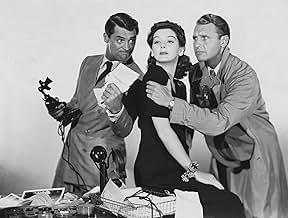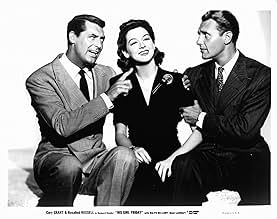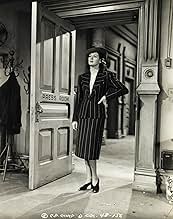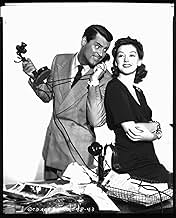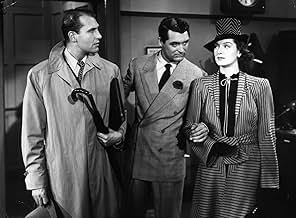Um editor de jornal usa todos os truques do livro para impedir que sua ex-mulher, uma repórter, se case novamente.Um editor de jornal usa todos os truques do livro para impedir que sua ex-mulher, uma repórter, se case novamente.Um editor de jornal usa todos os truques do livro para impedir que sua ex-mulher, uma repórter, se case novamente.
- Direção
- Roteiristas
- Artistas
- Prêmios
- 5 vitórias e 1 indicação no total
Avaliações em destaque
Every good thing you've heard about this movie is true. It may very well be the fastest paced movie I've ever seen. Jerry Bruckheimer's most hyperbolic action movie ain't got nothing' on this one.
Cary Grant and Rosalind Russell were a brilliant screen pair (indeed, it seems that no one was bad casting when paired with Cary Grant) as rival reporters in a furiously paced news office. Russell is the odd man, or should I say odd girl, out, due to her lack of a penis, but she proves herself more than capable of holding her own with the boys.
Russell charges across the screen and never loses momentum for a second. She's goofy, sexy and hysterical. The funniest moment in the film comes when she's chasing a man down the street (I won't go into details) and dive tackles him to the ground.
One of the first films from the 40s and a highlight of the decade.
Grade: A+
Cary Grant and Rosalind Russell were a brilliant screen pair (indeed, it seems that no one was bad casting when paired with Cary Grant) as rival reporters in a furiously paced news office. Russell is the odd man, or should I say odd girl, out, due to her lack of a penis, but she proves herself more than capable of holding her own with the boys.
Russell charges across the screen and never loses momentum for a second. She's goofy, sexy and hysterical. The funniest moment in the film comes when she's chasing a man down the street (I won't go into details) and dive tackles him to the ground.
One of the first films from the 40s and a highlight of the decade.
Grade: A+
Cary Grant and Rosalind Russell make great sparring partners in "His Girl Friday," a remake of "The Front Page."
Grant plays the conniving newspaper publisher Walter Johnson, and Rosalind Russell is the reporter Hildy Johnson, a woman this time, and Johnson's ex-wife. She's trying to get remarried, move to Albany, and quit the newspaper business, but Walter can't bear it.
He cons her into helping out with a controversial death row case and then makes sure her fiancée (Ralph Bellamy) suffers a series of mishaps - arrest for stealing a watch, arrest for "mashing," arrest for counterfeiting, and the theft of his wallet.
This all happens while Hildy interviews Earl Williams, a man due to be hung the next day... and then hides him in a roll-top desk in the courthouse press room when he escapes during a psychiatric evaluation.
It's madcap, all right, and there are no two better people to carry it off than Grant and Russell, who make a great team. It's a hilarious story, with the most rapid-fire, non-stop dialog ever heard anywhere, often with several conversations going on at once. It's exhausting trying to keep up with it.
Strangely, without computers and cell phones, the story of journalists working on a story holds up because the emotions and activities are realistic and still go on. It's as Hildy describes - no set schedule, no normal meals, and long hours. Nothing much has changed.
This is a frenetic comedy, and while the impending hanging of Earl Williams is certainly serious, this plot is more of an excuse to observe the machinations of Hildy and Walter - it's a subplot, though it drives the main story.
"The Front Page" is a favorite of Hollywood's, remade many times - three versions under its original title, a TV series, two TV productions, plus the film "Switching Channels." And of course, "His Girl Friday," possibly the best of all of them.
Grant plays the conniving newspaper publisher Walter Johnson, and Rosalind Russell is the reporter Hildy Johnson, a woman this time, and Johnson's ex-wife. She's trying to get remarried, move to Albany, and quit the newspaper business, but Walter can't bear it.
He cons her into helping out with a controversial death row case and then makes sure her fiancée (Ralph Bellamy) suffers a series of mishaps - arrest for stealing a watch, arrest for "mashing," arrest for counterfeiting, and the theft of his wallet.
This all happens while Hildy interviews Earl Williams, a man due to be hung the next day... and then hides him in a roll-top desk in the courthouse press room when he escapes during a psychiatric evaluation.
It's madcap, all right, and there are no two better people to carry it off than Grant and Russell, who make a great team. It's a hilarious story, with the most rapid-fire, non-stop dialog ever heard anywhere, often with several conversations going on at once. It's exhausting trying to keep up with it.
Strangely, without computers and cell phones, the story of journalists working on a story holds up because the emotions and activities are realistic and still go on. It's as Hildy describes - no set schedule, no normal meals, and long hours. Nothing much has changed.
This is a frenetic comedy, and while the impending hanging of Earl Williams is certainly serious, this plot is more of an excuse to observe the machinations of Hildy and Walter - it's a subplot, though it drives the main story.
"The Front Page" is a favorite of Hollywood's, remade many times - three versions under its original title, a TV series, two TV productions, plus the film "Switching Channels." And of course, "His Girl Friday," possibly the best of all of them.
10banjoboy
I just finished watching the DVD of this first-class, semi-Screwball comedy in Columbia Classics beautiful transfer, and it absolutely made my day! What a movie! What a screenplay! The dialogue is better - more modern - in fact, than a in lot of contemporary movies. It's incredibly funny, too, and my teenage sons kept laughing right along with me at the smart come-backs. Cary Grant is, of course, as good (if not better) than ever, and I've never seen Rosalind Russel in a role that suited her more perfectly. And that's just for starters: The timing of the thing is still awe- inspiring after sixty-odd years; the supporting actors, down to the bit-players, are all memorable, convincing and hilarious; the camera work (this IS the forties, though) is inventive and the editing superb. I can safely confess now that I hadn't ever seen it before, but that's no reason for you to make the same mistake: Go buy/rent it NOW! Hats off to the great Howard Hawks, his cast and crew for pulling this comedy masterpiece off. And thank you, thank you, thank you Columbia Pictures, for
making it possible for me to watch it in such pristine condition! (I've got the 2002 edition, and from what I've heard you should beware of earlier DVD issues).
making it possible for me to watch it in such pristine condition! (I've got the 2002 edition, and from what I've heard you should beware of earlier DVD issues).
A very, very funny movie, this rapid-fire farce combines a terrific cast, a great script, and a plot that lends itself wonderfully both to comedy and satire. There are more funny lines and good gags than you can count, even when you've already seen it a few times.
Cary Grant is excellent at this kind of manic comedy, and Rosalind Russell gives what had to be one of her very best performances, as a worthy foil for Grant's domineering character. Ralph Bellamy is also ideal as the naive insurance salesman, and they are backed up by a cast filled with fine comic character actors. Some of the supporting cast do a terrific job of getting laughs with very limited screen time. They all get great material to work with, too. The dialogue is just amazing, with funny, creative lines coming constantly - sometimes literally on top of each other. The setting and the plot create hilarious situations and some great opportunities to satirize politicians and the news media. If anything, the satire is even funnier and more appropriate as regards today's institutions than it was in 1940.
"His Girl Friday" is absolutely hilarious, a classic comedy that you can watch and enjoy over and over.
Cary Grant is excellent at this kind of manic comedy, and Rosalind Russell gives what had to be one of her very best performances, as a worthy foil for Grant's domineering character. Ralph Bellamy is also ideal as the naive insurance salesman, and they are backed up by a cast filled with fine comic character actors. Some of the supporting cast do a terrific job of getting laughs with very limited screen time. They all get great material to work with, too. The dialogue is just amazing, with funny, creative lines coming constantly - sometimes literally on top of each other. The setting and the plot create hilarious situations and some great opportunities to satirize politicians and the news media. If anything, the satire is even funnier and more appropriate as regards today's institutions than it was in 1940.
"His Girl Friday" is absolutely hilarious, a classic comedy that you can watch and enjoy over and over.
Charles McArthur and Ben Hecht met when both were reporters in Chicago during the 1920s. They created two of the funniest farces in American drama, TWENTIETH CENTURY (about theater people) and THE FRONT PAGE. The latter was based on their experiences as news reporters in those crazy days in Chicago, where the newspapers concentrated on sensationalism and the politics was thoroughly corrupt. The resulting play is hysterically funny and yet remains timely. For all the exaggeration of how Walter Burns and Hildy Johnson manipulate police, politicians, reporters, and civilians to get their scoop, the story remains relevant for several reasons. The political balance in a big Mayoralty election is precarious due to the Earl Williams case. Williams has shot a policeman who is African-American, a big local voting block, and they want him punished. The corrupt Mayor and his idiot jail warden are willing to execute him for the votes needed to stay in office, but the Governor (who is from the rival party) believes the killer is insane (or at least mentally deficient). So already (as you see) race, politics, and the validity of the death penalty get pulled in. Soon we also see examples of nepotism and corruption in the police, and City Hall, cynical politics based on a man's life, and questions about privacy and a free press. For a play from 1931 this one still has relevance.
There had been an earlier version of the play in the 1930s called THE FRONT PAGE, starring Adolphe Menjou as the conniving and devious Walter Burns, and Pat O'Brien as ace reporter Hildy Johnson. It is a good version, and both stars do well with their parts (and both have the verbal speed necessary for the dialog to flow over the ears of the audience). But when the film was remade in 1940, Howard Hawks decided to redraw Hildy Johnson into a female reporter (and previous wife) of Burns. His casting of Cary Grant was radically different too. Burns is a nasty, conniving s.o.b. who would kill for a good story. Menjou was somewhat dapper (he was usually dapper) in the role, but the hardness under the presentable shell was there. And by changing Hildy from a guy to a gal, and Walter's former wife, you had to make Walter look more interesting. So Walter is turned into Cary Grant. There was a search for Hildy, involving Jean Arthur and Irene Dunne as possibilities. Neither ended up playing him. Instead it went to Rosalind Russell.
It has to be admitted Russell had the vocal abilities to push the dialog at the proper clip. Possibly Jean Arthur could have done that just as well, but Arthur did not have the apparent physical strength behind the stylishness that Russell showed. She really does balance well (in this film) with Grant, given their characters.
Motivation changes a little. This Walter Burns still wants to get his scoops, but there are moments of fragility when he realizes he may forever lose Hildy to her fiancé Bruce (the ever helpless Ralph Bellamy). And they oddly work (Hawks manages to keep them under control). Also, as the story is now twelve years older than the original play, certain changes occur in Walter's political views. He does dislike the gang (led by Clarence Kolb and Gene Lockhart) running the city, and points out to Hildy that they have a chance to help give the city the sort of government New York City has under La Guardia. This does not end his joy at scooping the opposition, but it does suggest that Burns has more depth.
It is now generally believed that this is the best of the film versions of THE FRONT PAGE, and one of the funniest films ever made. The entire cast shines (look at the scene where Helen Mack confronts the reporters who have made her look like a tramp, and have told lies about John Qualen (Williams) - she is in a state when Russell takes her out of the press room, and the reporters are thoroughly ashamed of herself - and Russell comes back looking at Regis Toomey, Porter Hall, and the others, and says "Gentlemen of the Press!" with heavy cynical irony). And also note Billy Gilbert's immortal Joe Pettibone, the most hopeless monument of total befuddlement in movies. It is one of the few film comedies of that period that retains it's laughs one viewing following another.
There had been an earlier version of the play in the 1930s called THE FRONT PAGE, starring Adolphe Menjou as the conniving and devious Walter Burns, and Pat O'Brien as ace reporter Hildy Johnson. It is a good version, and both stars do well with their parts (and both have the verbal speed necessary for the dialog to flow over the ears of the audience). But when the film was remade in 1940, Howard Hawks decided to redraw Hildy Johnson into a female reporter (and previous wife) of Burns. His casting of Cary Grant was radically different too. Burns is a nasty, conniving s.o.b. who would kill for a good story. Menjou was somewhat dapper (he was usually dapper) in the role, but the hardness under the presentable shell was there. And by changing Hildy from a guy to a gal, and Walter's former wife, you had to make Walter look more interesting. So Walter is turned into Cary Grant. There was a search for Hildy, involving Jean Arthur and Irene Dunne as possibilities. Neither ended up playing him. Instead it went to Rosalind Russell.
It has to be admitted Russell had the vocal abilities to push the dialog at the proper clip. Possibly Jean Arthur could have done that just as well, but Arthur did not have the apparent physical strength behind the stylishness that Russell showed. She really does balance well (in this film) with Grant, given their characters.
Motivation changes a little. This Walter Burns still wants to get his scoops, but there are moments of fragility when he realizes he may forever lose Hildy to her fiancé Bruce (the ever helpless Ralph Bellamy). And they oddly work (Hawks manages to keep them under control). Also, as the story is now twelve years older than the original play, certain changes occur in Walter's political views. He does dislike the gang (led by Clarence Kolb and Gene Lockhart) running the city, and points out to Hildy that they have a chance to help give the city the sort of government New York City has under La Guardia. This does not end his joy at scooping the opposition, but it does suggest that Burns has more depth.
It is now generally believed that this is the best of the film versions of THE FRONT PAGE, and one of the funniest films ever made. The entire cast shines (look at the scene where Helen Mack confronts the reporters who have made her look like a tramp, and have told lies about John Qualen (Williams) - she is in a state when Russell takes her out of the press room, and the reporters are thoroughly ashamed of herself - and Russell comes back looking at Regis Toomey, Porter Hall, and the others, and says "Gentlemen of the Press!" with heavy cynical irony). And also note Billy Gilbert's immortal Joe Pettibone, the most hopeless monument of total befuddlement in movies. It is one of the few film comedies of that period that retains it's laughs one viewing following another.
Você sabia?
- CuriosidadesIt is estimated that the normal rate of verbal dialogue in most films is around 90 words a minute. In Jejum de Amor (1940), the delivery has been clocked at 240 words a minute.
- Erros de gravaçãoWhen Bruce Baldwin comes to the press room late in the movie, an electric fan and small shelf on the wall to the left of the door both completely disappear. Both have been there in all previous scenes and both reappear after this scene.
- Citações
[describing Bruce]
Walter Burns: He looks like that fellow in the movies - Ralph Bellamy.
- Cenas durante ou pós-créditosOpening credits prologue: It all happened in the "Dark Ages" of the newspaper game--when to a reporter "Getting that story" justified anything short of murder.
Incidentally you will see in this picture no resemblance to the man and woman of the press today.
Ready?
Well, once upon a time - -
- ConexõesEdited into Michael Jackson: This Is It (2009)
Principais escolhas
Faça login para avaliar e ver a lista de recomendações personalizadas
- How long is His Girl Friday?Fornecido pela Alexa
- In what year or era is this Movie set? Was it considered a modern movie in its day?
- Is this movie based on a book?
- What does the title mean?
Detalhes
- Data de lançamento
- País de origem
- Idiomas
- Também conhecido como
- Ayuno de amor
- Locações de filme
- Empresa de produção
- Consulte mais créditos da empresa na IMDbPro
Bilheteria
- Faturamento bruto mundial
- US$ 330
- Tempo de duração1 hora 32 minutos
- Cor
- Proporção
- 1.37 : 1
Contribua para esta página
Sugerir uma alteração ou adicionar conteúdo ausente




